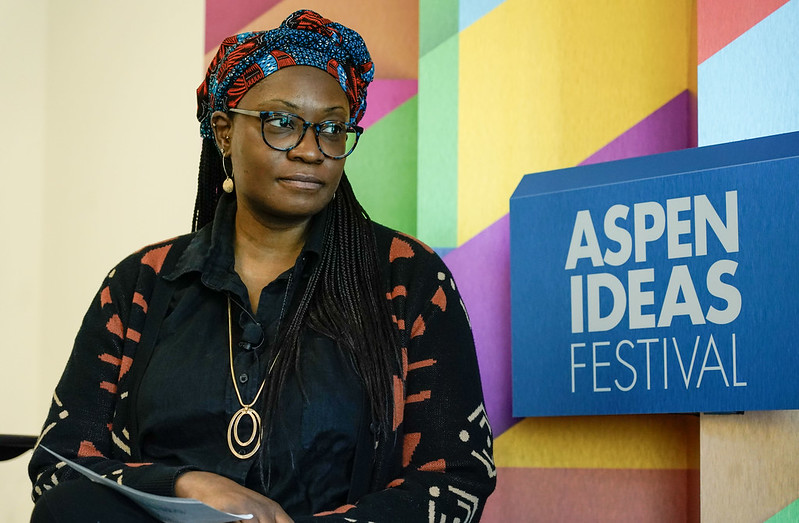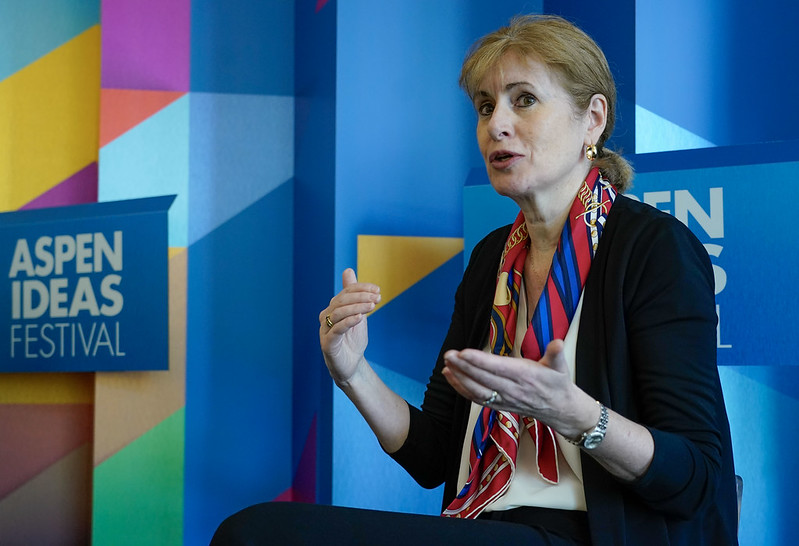
How can we unlock the power of entrepreneurship to widen access to health care, close gender disparity, and increase prosperity in the Global South region? At Aspen Ideas 2023, we heard from Lola Adedokun, Executive Director of the Aspen Global Innovators Group and Co-Chair of Aspen Forum on Women and Girls and Richenda Van Leeuwen, Executive Director of the Aspen Network of Development Entrepreneurs, on tools to address social, economic, and environmental challenges in developing economies.
The discussion focused on amplifying the work of leaders who are developing innovative solutions to complex challenges at a local level. The conversation also touched on the potential for these solutions to be replicated and scaled, the importance of gender equality and digital access, and the role of small businesses in economic growth and development.
The role of women entrepreneurs in tackling climate change
Women entrepreneurs hold a vital position in addressing climate change and bringing forth sustainable solutions, but often face unconscious bias and lack of access to capital. Van Leeuwen emphasized that while we have historically underestimated and undervalued women, enabling women leaders in the sector not only addresses the gender gap, but also presents innovative climate solutions.
“Please look at women as solutions’ providers, and let’s equip them so that they can go out and just do this wonderful stuff,” she said. Van Leeuwen also stressed the need for more integrated, holistic solutions and the importance of viewing climate action and support for women as leaders as complementary rather than separate goals.
She further suggested that philanthropy strive to integrate gender and climate change initiatives together. This could help in maximizing the leadership potential of women as climate solutions providers.

The importance of localization in development initiatives
Both Lola Adedokun and Van Leeuwen pointed out the need to redirect funding and resources to local organizations to ensure sustainability and impact.
Adedokun noted there’s a resurgence in the commitment to localization as a result of the pandemic. She stated, “There’s such an opportunity now to invest in women entrepreneurs locally in meaningful ways.” Van Leeuwen agreed, explaining that while international capital is needed, there’s also a need to tailor strategies to the local context and to support local organizations, both in terms of project grants and capacity building.
The role of small businesses in economic growth and development
Van Leeuwen explained that small businesses contribute significantly to employment and economic growth in developing countries and stressed the need for more support and investment in this area.
“Small businesses are the engines of economic growth and development. In developing countries, they contribute as much as 50% of employment,” she said. She also pointed out the barriers that small businesses, particularly those led by women, face in scaling up. There is a need for early-stage capital, and more holistic support to overcome these barriers.
Addressing barriers to digital access
The conversation underscored the need to address barriers to digital access, especially in developing countries. While the pandemic has accelerated digitalization, Van Leeuwen stressed that there’s still a significant digital divide.
“The pandemic was digitalization by necessity rather than necessarily just because it was already part of their business plan,” she said. She noted that while some businesses were able to adapt and pivot to digital, many others still lack access to digital connection, thereby limiting their growth potential.
The importance of investing in girls’ education and family planning
Adedokun highlighted the potential of not only promoting gender equality but also tackling issues like climate change and economic development.
“One of the biggest fears and concern is the pandemic impact. 47 million more women have been placed into extreme poverty… We’re trying to find ways to bring them back in to the workforce but also to think about the whole family approach,” said Adedokun.
